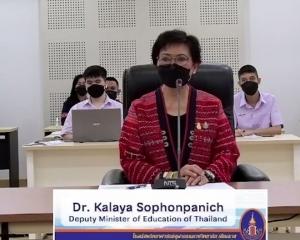Forget the forthcoming rugby world cup; the real spectator event this year will be how the Government, and in particular the Minster of Education, Anne Tolley, handles her education portfolio.
The match entered the second half recently with Prime Minister John Key dumping Mrs Tolley from the tertiary education portfolio for the more agile Steven Joyce, well known for his adeptness to run with the political football.
Mrs Tolley endured a tough year in 2009 and already some are privately asking if she is up to the enormous task she has taken on.
John Key's actions in stripping her of the tertiary education portfolio are a serious blow to her credibility.
The rationale behind the move appears to be one of concern to enable her undivided attention to the implementation of National Standards.
Further investigation suggests, politically, that the prime minister is pre-empting the possibility of a similar breakdown in relationships with important tertiary sector leaders by replacing Mrs Tolley.
Mrs Tolley's mismanagement of the education portfolio became evident early when she failed to establish working relationships with teachers, boards of trustees and the teacher unions.
Further examples of mismanaging important sector relationships appeared when she threatened to sack boards of trustees if they failed to implement National Standards.
Recently, the Prime Minister and Mrs Tolley have been attempting to handle that fallout.
Both hardline attitudes have softened, with the Prime Minister indicating the Government will be "working constructively with the school sector".
Mrs Tolley acknowledged she did not work closely with boards of trustees last year and, according to Tai Tokerau Principals Association president Pat Newman, "when a minister threatens a community with sacking them, when they are genuine people concerned about education, there is something wrong".
According to Mr Newman, when the law is stupid, people should not hide behind it and he believes the minister is yet to put up any evidence that the political action she wants to take "will help one child in New Zealand".
The latest revelation (ODT 2.2.10) that Maori Party co-leader and Associate Minister of Education Dr Pita Sharples appeared to have withdrawn support for National Standards because he had "grave concerns" had Mrs Tolley ducking for cover and the Prime Minister fronting the media. This is not a good start to the 2010 National Standards road show.
If the Associate Minister of Education has concerns, what does that say about the teachers' and parents' current standoff ? Poor policy is poor policy and finally it is catching up with key politicians.
The recall of esteemed academic Prof John Hattie to John Key's side last week suggests an imminent announcement is due regarding a changed focus with National Standards, but don't expect radical change.
The Prime Mimister's ongoing involvement in the National Standards debate indicates concern and a lack of confidence in Mrs Tolley's ongoing ability to manage issues.
Mrs Tolley's challenge is that at least 80 schools have indicated they are going to boycott the implementation of National Standards - and the possibility of further boycotts is not a good look for the Government's profile mid-cycle.
Clearly, the Government regards National Standards as a major policy item.
To back down or lose face in the public eye is untenable, as it would be perceived as a victory for the teachers, the unions and common sense.
Has the teaching profession simply set out to corrupt the process of National Standards' implementation or does it have valid concerns? National Standards are contentious and unproven.
International research shows no good reason for their introduction and New Zealand schools already have and use a variety of reliable assessment tools.
By comparison, the introduction of the new New Zealand curriculum has been an example of partnership and co-operation.
If teachers were hellbent on destruction, why would they be co-operative with one major policy reform initiative and not the other?
Teachers are to an extent guided by their code of ethics and the New Zealand Teachers Council's "satisfactory teacher dimensions" which require them "to safeguard and promote the interest and wellbeing of learners . . . and to demonstrate knowledge of teaching and learning based on ongoing study, research, reflection and practice".
To argue those teachers should lie down and be rolled over by bad policy would be a dereliction of duty to the children in their care.
There has been a stream of misinformation relating to National Standards from the minister and the position she finds herself in is largely of her own making.
That she has had to go cap in hand to the Prime Minister to secure an additional $26 million to sell National Standards speaks for itself.
Communities are about to be subject to the latest "charm offensive" in the form of a New Zealand-wide National Standards roadshow.
Astute parents, however, will know that last year Adult Community Education (ACE) nationally faced massive cuts to its budgets and is now a shadow of its former self.
The cuts to the ACE budget are close to the $26 million now funding the National Standards roadshow.
Win, lose or draw, the second half in the tussle over the introduction of National Standards is shaping up to be a tough match.
May the minister realise there is a difference between doing things right and doing the right things, and that you cannot mandate for what matters.
May the children of New Zealand and their future education be the uncontested winners.
Dr Darrell Latham is a senior lecturer and manager of professional education services at the University of Otago College of Education.











